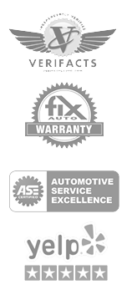Everything You Need to Know About EV Charging Stations
October 1st, 2020 by Fix Auto USA

If you own an electric vehicle (EV) or are considering purchasing one in the near future, it’s good to know about EV charging stations. Because, if you know about EV charging stations, how they work, and where to find them, you can keep your vehicle running – regardless of when and where you drive.
How Do Public EV Charging Stations Work?
A public EV charging station lets you plug in your car and recharge it. You can keep your electric car plugged in as long as necessary at a public EV charging station, so you can avoid the risk that your vehicle will run out of power while you’re driving.
What Type of EV Charging Station Do You Need?
There are three types of public EV charging stations:
- Level 1: Provide an average of two to five miles of range per hour of charging.
- Level 2: Can fully charge an EV in about two hours.
- Level 3: Deliver 60 to 100 miles of range per approximately 20 minutes of charging.
All EVs are compatible with Level 2 chargers, but the electric car charging port varies based on the EV make and model. Thus, it is important to determine if an electric car charging port corresponds to the type of public EV charging station.
Do You Have to Pay to Charge Your Car at an EV Charging Station?
There are three public EV charging station models:
- Pay-As-You-Go: Pay for any electricity you use to recharge your EV.
- Monthly Subscription: Pay a set monthly fee, so you can recharge your EV as often as you’d like.
- Free: Recharge your EV without any fees.
Also, Tesla offers charging incentives with purchase of its EVs, please reference their website for more information.
Where Are Public EV Charging Stations Located?
Public EV charging stations are located in many urban areas across the United States. The U.S. Department of Energy and ChargeHub offer free tools that EV drivers can use to locate these stations.
Recent research indicates there are more than 17,500 public charging stations in the United States. As the demand for EVs grows, the number of public EV charging stations may increase accordingly.
What Are EV Fast Charging Stations?
EV fast charging stations let electric car drivers recharge up to 80% of their battery’s full capacity in about 30 minutes. However, not every EV enables drivers to take advantage of EV fast charging stations.
EVs capable of direct current (DC) fast charging have a different connector than the J1772 connector used for Level 2 charging. To determine if an EV is capable of DC fast charging, evaluate the electric car charging port. If the port has a CCS1, CCS2, or CHAdeMO connector, you can recharge your EV at an EV fast charging station.
Should You Use a Public Charging Station?
Public EV charging stations are available in cities and towns nationwide, and they make it easy for electric car owners to recharge their vehicles. But, using these stations may be more costly than recharging an EV at home.
Research indicates the average cost to recharge an EV at home falls between $850 and $2,200 annually. Meanwhile, the cost to consistently charge an EV at a public charging station may be higher, depending on how often you visit the station and how much power your vehicle requires.
Is Your EV Not Charging Properly After a Collision? Here’s What You Need to Do
Suppose your EV is involved in a collision and is not charging properly at home or a public charging station. In that case, you should get your vehicle inspected by trained and certified automotive technicians to ensure your vehicle can charge at home or public charging stations safely and efficiently.
If you are looking for reliable collision repair for your EV, use our store locator to find the nearest Fix Auto collision repair center near you! Our body shops work on all make and models, so bring your car in with confidence!
This blog post was contributed by Fix Auto Downtown El Monte, a leading industry expert and collision repair shop servicing El Monte.
Welcome to
Fix Auto USA
We are the premier independent body shop network delivering world-class customer service and high-quality collision repairs across the U.S.
Learn About Us




